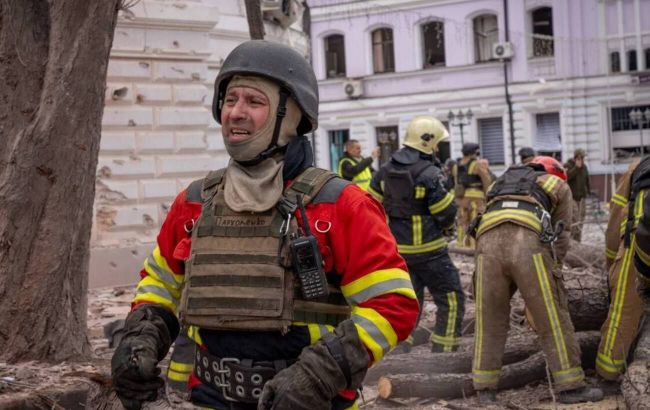Kremlin’s strategy: Why Putin targets Ukrainian civilians during peace talks
 Photo: Aftermath of the Russian strike on the city of Sumy on April 13 (t.me/dsns_telegram)
Photo: Aftermath of the Russian strike on the city of Sumy on April 13 (t.me/dsns_telegram)
Russia continues its terror against Ukrainians, with deadly strikes in Kryvyi Rih and Sumy serving as clear evidence. The aggressor will likely persist with deliberate attacks on civilians as part of its ongoing strategy.
RBC-Ukraine explores below what these attacks have in common and outlines the Kremlin’s broader strategy.
Takeaways:
-
Why is Putin attacking peaceful Ukrainians specifically during talks with the US?
-
Are the mass casualties in Kryvyi Rih and Sumy part of the Kremlin’s broader strategy?
-
What’s behind the barbaric bombing of Ukrainian cities?
-
Is Putin trying to break Ukrainians’ will to resist through such actions?
-
Will the attacks on peaceful cities continue, and why is this important for Putin?
A component of the Kremlin’s broader strategy
On April 4, Putin’s army used an Iskander-M ballistic missile with a cluster warhead to strike Kryvyi Rih. The warhead exploded mid-air over a residential neighborhood.
This barbaric attack was designed for maximum area impact and mass casualties. As a result, 19 people were killed, including nine children. Just hours later, the city was struck again, this time by attack drones, which caused fires in several districts and killed one more person.
Despite images of the dead at a children’s playground circulating around the world, Russia’s Ministry of Defense cynically claimed it had targeted “a meeting place for commanders and instructors in one of Kryvyi Rih’s restaurants.” Meanwhile, the Kremlin continued to lie, insisting it "does not target civilians." Ukraine’s General Staff officially refuted these Russian claims.
Days later, Russia repeated the same terrorist pattern. On April 13, Palm Sunday, two ballistic missiles were launched into the center of Sumy. Once again, the missiles were equipped with cluster munitions. The attack killed 35 people and injured 119 more, including children among the casualties.
Trying again to justify the terror strike on peaceful civilians, Russia’s Ministry of Defense fabricated a new version of events, alleging the Iskander missiles hit the site of “a command meeting of the Ukrainian Armed Forces.”
Ukrainian military analyst Kostiantyn Mashovets told RBC-Ukraine that the Russian strikes on Kryvyi Rih and Sumy should be viewed as deliberate terror against civilians.
“First of all, I believe this is indeed targeted terror specifically against the civilian population. Secondly, I think it’s one element of the Kremlin’s broader strategy being implemented in this war,” Mashovets said.
According to him, the purpose of this element is to influence Ukrainian public consciousness.
“And this particular method — delivering powerful strikes with high civilian casualties — is, in the Kremlin’s view, the most effective in terms of psychological impact. These types of attacks, they believe, will quickly affect the collective mindset of the people,” the expert added.
Why Putin targets Ukrainian civilians amid talks with the US
It’s important to note that these Russian strikes occur while US President Donald Trump is attempting to broker a comprehensive ceasefire. However, he has yet to compel Russia to adhere even to energy-related agreements.
Notably, after the attack on Kryvyi Rih, Trump, who has recently expressed dissatisfaction with Moscow’s actions, albeit not sharply, called on Russia to "move" and end the war in Ukraine.
Additionally, on April 11, a meeting took place between Russian President Vladimir Putin and Trump’s special representative Steve Witkoff. However, while Washington continued its diplomatic efforts, Moscow once again carried out a terrorist attack against Ukrainians, this time targeting the city of Sumy.
Commenting on the deadly Russian assault, Trump called the attack on Sumy "terrible" and added that Russia "made a mistake."
"I think it was terrible, and I was told they made a mistake. But I think it's a horrible thing. I think the whole war is a horrible thing," the US president stated.
Nevertheless, the question arises: why does Putin continue to target Ukrainian cities specifically during negotiations with the US over ending the Russian-Ukrainian war? According to expert Kostiantyn Mashovets, the Russian leader clearly views terrorist strikes as more important for his war strategy than the negotiations themselves.
"In other words, he (Putin) doesn’t take them (the negotiations) seriously," the expert emphasizes.
Will such strikes continue?
The fact that attacks on Ukraine persist during any negotiation tracks shows that Putin is not seeking peace, but Ukraine’s capitulation or a freeze of the conflict on his terms. This is emphasized by the Ukrainian government, which calls on the West to apply pressure on the Kremlin leader.
Trump’s assessment that Putin is "ready for peace" does not align with reality, as even when formal ceasefire negotiations are taking place, Russia continues its attacks and, in fact, intensifies them. This raises another question: could the Kremlin leader be deliberately portraying himself as irrational in front of the US with some purpose?
“We are now entering a path of assumptions. Whether he is portraying himself as crazy or mad, or whatever he is trying to show — these are more matters of speculation, conspiracy theories,” analyst Mashovets responds.
When asked whether this means there is a threat of repeated targeted Russian strikes on Ukrainian civilians, the expert answered affirmatively.
“Yes, there is. It’s entirely possible,” Mashovets concluded.
After the missile strikes by Russian forces on Kryvyi Rih and Sumy, several Western leaders, officials, and diplomats condemned the actions of the Kremlin.
In particular, the UK, Germany, and Finland called for an immediate ceasefire and for holding Russia accountable.
Additionally, US Secretary of State Marco Rubio, commenting on the Russian attack on Sumy, expressed "deepest condolences" to the families of the killed and wounded. More on this can be found in the separate RBC-Ukraine material titled 'Russia is ruled by murderers': Western leaders react to Russia's deadly strike on Sumy.
Sources: messages from the State Emergency Service, the General Staff of the Armed Forces of Ukraine, local authorities, statements from the leaders of countries and governments, as well as an exclusive comment from military analyst Kostiantyn Mashovets.

